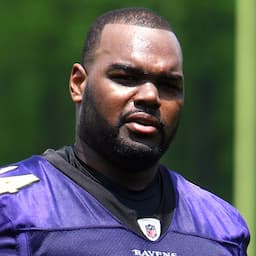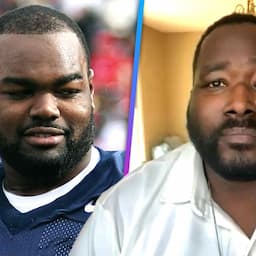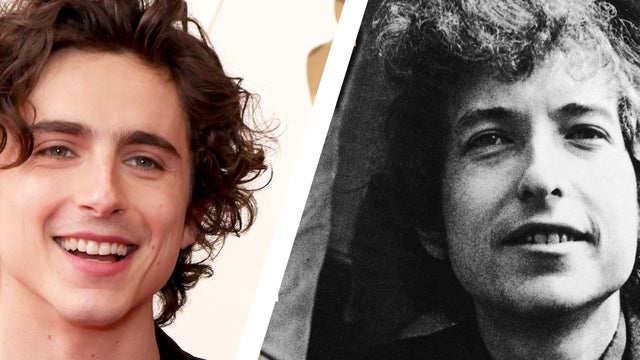The Oscar-winning film claimed to be 'based on the extraordinary true story' -- but changed a few key details.
The new lawsuit surrounding the real-life characters depicted in the 2009 film The Blind Side has caused many to take a closer look at the film itself.
This week, former NFL star Michael Oher filed a lawsuit against the Tuohy family -- depicted in the Oscar-winning film as kind-hearted Christians who take in Oher and set him on a path to football greatness -- alleging that they tricked him into a conservatorship shortly after he turned 18.
In his lawsuit, Oher -- whose story was first documented in Michael Lewis' 2006 bestselling book, The Blind Side -- claims the Tuohy family made millions in royalties off his name after the film earned more than $300 million at the box office. He also claims that when he agreed to the conservatorship, he thought he was signing adoption papers.
In a statement to ET, the Tuohys' family attorney, Marty Singer, claimed that Oher, prior to filing his petition in court, allegedly threatened the family that if they didn't fork over an eight-figure check, he would plant a negative story about them in the press.
Furthermore, the Tuohys denied "tricking" Oher into a conservatorship, declaring that any claims that they went behind his back to score a lucrative movie deal are just not true.
"The notion that a couple worth hundreds of millions of dollars would connive to withhold a few thousand dollars in profit participation payments from anyone -- let alone from someone they loved as a son -- defies belief," Singer told ET in a lengthy statement.
While the film promoted itself at the time of its release as "based on the extraordinary true story" of Oher and the Tuohys, it was clear even then that some key details had been changed.
Oher, an offensive tackle who played for Ole Miss and later won a Super Bowl with the Baltimore Ravens, has previously expressed sorrow over how he's depicted in the film, particularly the way it depicts his academic struggles.
"People look at me, and they take things away from me because of a movie," Oher told ESPN in 2015. "They don't really see the skills and the kind of player I am. This stuff, calling me a bust, people saying if I can play or not ... that has nothing to do with football. It's something else off the field. That's why I don't like that movie.''
While Oher has publicly praised the performance of Quinton Aaron, the actor who played him in the movie -- opposite Sandra Bullock, who won a Best Actress Oscar for her portrayal of matriarch Leigh Anne Touhy -- he wrote in his 2011 memoir, I Beat the Odds: From Homelessness to The Blind Side and Beyond, that the film misrepresented parts of his life.
"While the movie did a great job of raising awareness about teens in foster care who might succeed if given a loving family and a chance, it did not do a good job of accurately painting my life," he shared. "Situations get exaggerated for the sake of Hollywood. I understood that when I heard a movie was being made, but it’s a strange process to live through: to suddenly lose control of your own story and to have your story written and nearly completed before you were approached for an interview."
Read on to learn more about what The Blind Side altered about Oher's story -- and what he had to say about it at the time.
Oher was one of 12 children.
The film accurately portrays how Oher's childhood was affected by food insecurity and homelessness amid his mother's drug addiction, however, it leaves out that he was struggling with 11 other siblings.
"When my mother was off drugs and working, she would remember to buy groceries and there would be a mad scramble to grab whatever you could before anyone else got to it," he shared in his memoir.
Child services removed Oher and his siblings from their mother's home when he was in first grade, and, as the film depicts, he spent years bouncing between foster homes and couch surfing at friends' houses.
Oher's academic situation was more complicated than the film portrays.
In the film, a coach named Burt Cotton helps Michael get admitted to the esteemed Wingate Christian School so that he can take advantage of his size and raw athleticism on the football field. Neither Cotton nor Wingate Christian exist in real life.
In reality, Oher was staying with a local Memphis coach and athletic director, Tony Henderson, when he tagged along to Henderson's son's admissions interview at the prestigious Briarcrest Christian School. The school was reluctant to admit Oher due to low IQ test scores and the fact that his reading comprehension was at an elementary level.
However, when looking at the timeline, it's clear there are reasons for Oher being academically stunted. He was forced to repeat the first and second grade -- which was right at the time he and his siblings were entering the foster care system. As his living situation remained unstable, he was, understandably, prioritizing things like food and shelter over getting his homework done.
"I felt like [the movie] portrayed me as dumb instead of as a kid who had never had consistent academic instruction and ended up thriving once he got it," Oher wrote in I Beat the Odds.
He went into more detail in an August 2023 interview on The Jim Rome Show, revealing how he thinks the movie affected the perception of him in the NFL.
"The movie took away the hard work and dedication I had from a child. First one in the locker room, last one out," he shared. "I think the biggest, for me, is being portrayed as not being able to read or write. Second grade, I was doing plays in front of the school. When you go to a locker room and your teammates don’t think you can learn a playbook, that’s heavy."
Oher's disappointment in how the movie depicted his intelligence is a detail Aaron remembers from meeting him when they first met after The Blind Side was released.
"He told me at that time, he said he liked the movie, but he said there were a couple of things he wasn't cool about," the actor recalled. "He didn't like the fact that the movie displayed it as he didn't know how to play football, made it look like he was uneducated. He felt like he had more to bring to the story than that and it wasn't [shown] that way."
Oher knew football.
One of the other biggest sticking points for the real-life NFL star was that the film showed him having to learn the game of football from the Tuohys after they took him in. The Tuohys' young son, S.J. (Jae Head), explains blocking formations by sliding around condiment bottles on the family's dining room table, and Leigh Anne calls on Michael's protective nature over her young son to motivate him to keep the quarterback safe.
In real life, Oher continued to couch surf throughout his first few years at Briarcrest, and was involved with football, track and field and basketball before ever meeting the Tuohys.
"I could not figure out why the director chose to show me as someone who had to be taught the game of football," Oher wrote in his memoir. "Whether it was S.J. moving around ketchup bottles or Leigh Anne explaining to me what blocking is about, I watched those scenes thinking, 'No, that's not me at all! I've been studying — really studying — the game since I was a kid!' That was my main hang-up with the film."
Oher wasn't adopted by the Tuohys.
The future Super Bowl winner was 18, legally an adult, before the Tuohys entered his life, and he told Rome that he feels his "struggle and fight for survival" was, for the most part, "a solo journey... You don’t need to have someone come save you and rescue you to be successful."
"I survived the hands dealt to me from the ages of three to 18, before the Tuohys ever entered the scene like you saw on the big screen," he wrote in his memoir.
While the family, including Oher, have previously used the term "adopted," to refer to their relationship, Oher's new lawsuit alleges that he was tricked into a conservatorship instead, which gave the Tuohys legal authority to make business decisions in his name.
Oher claims in the petition that he only learned in February 2023 that the documents he was asked to sign by the Tuohys, under the belief that it was part of the "adoption process," were actually conservatorship papers that would strip away his legal rights.
However, in a new interview with the Daily Memphian, Sean Tuohy claims that he was advised to set up a conservatorship to avoid any backlash from the NCAA when Oher signed up to play college football at Ole Miss, where Tuohy had attended and could be considered a booster.
"Michael was obviously living with us for a long time, and the NCAA didn’t like that," Tuohy claimed. "They said the only way Michael could go to Ole Miss was if he was actually part of the family. I sat Michael down and told him, 'If you’re planning to go to Ole Miss — or even considering Ole Miss — we think you have to be part of the family. This would do that, legally.'"
"We contacted lawyers who had told us that we couldn’t adopt over the age of 18; the only thing we could do was to have a conservatorship," he added. "We were so concerned it was on the up-and-up that we made sure the biological mother came to court."
Adoption is, in fact, legal after 18 in the state of Tennessee, but Tuohy claims he was advised against it. He also told the Daily Memphian that he was willing to end the conservatorship, if that's what Oher wanted.
RELATED CONTENT:



